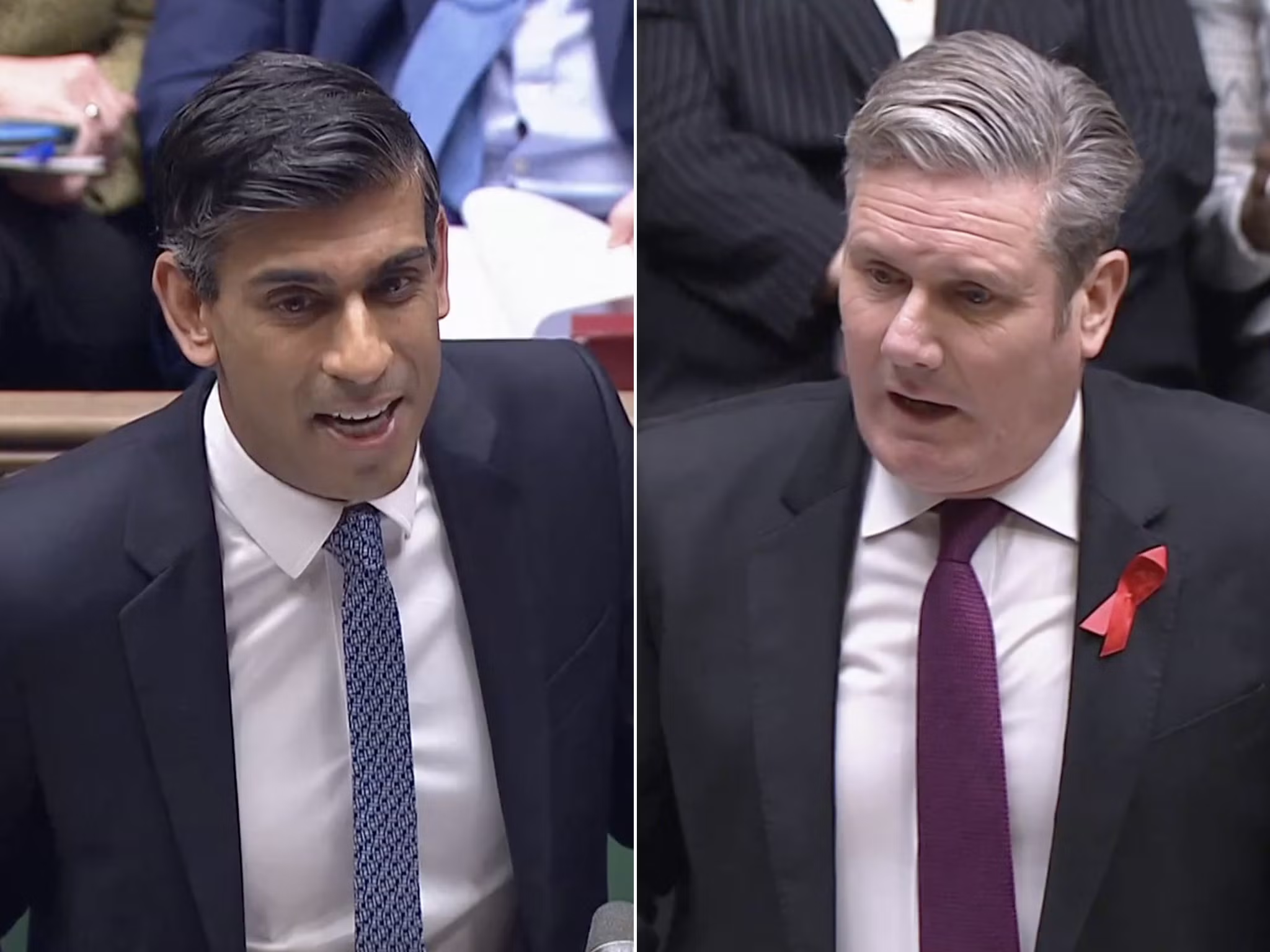We’ve now had a depressing preview of the next election
Keir Starmer and Rishi Sunak traded dismal slogans at Prime Minister’s Questions, writes John Rentoul


Keir Starmer’s first question in the Commons today was about Winchester, the prime minister’s private school. It was a question that Tony Blair would never have asked, and not just because Blair went to Fettes, a fee-paying school in Edinburgh. Blair wouldn’t have asked it because he agrees with Rishi Sunak, who said: “This is a country that believes in opportunity not resentment.”
This isn’t a question that can be settled by opinion poll. Some Labour people were delighted that the Daily Mail had used its front page twice this week to attack the party’s policy of charging VAT on school fees. They point to poll findings that suggest the policy is popular, and were crowing that the Mail was giving it free publicity.
The policy is particularly popular if the question is asked about “ending the tax break” for private schools, or even, as Starmer put it today, stopping the government “giving” a school such as Winchester £6m. But “higher taxes on someone else” is always popular in opinion polls, whether it is private schools, oil giants or non-doms. It may be just as significant that other polls find that most people in Britain would send their children to private school if they could afford it.
Starmer’s advisers say that Britain has moved on since Blair’s day. We shall see. The only test is a general election, in which so many other things affect the result that it is not possible to isolate the effect of a single policy.
It is understandable that Starmer failed to resist the subject of taxing school fees, because Michael Gove, the ultra-Blairite cabinet minister, once wrote an article in favour of VAT on fees that used some typically colourful phrases: calling the exemption “egregious state support” and saying, “you could scarcely find a better way of ending burning injustices [the article was written in Theresa May’s time] than scrapping these handouts”.
What was less understandable was Starmer’s decision to personalise his attack on Sunak’s own school, which was a way of trying indirectly to use Sunak’s wealth against him. Ruthless, unpleasant and quite possibly effective.
The prime minister’s counterattack, to blame Starmer for school closures during the pandemic because of his “union paymasters”, on the other hand, was ruthless but ineffective. In the election campaign that is shaping up between Starmer and Sunak, the Labour leader already has two clear lines of attack: “You’re too rich” and “You’re too weak”. I don’t think the first works anything like as well as Starmer’s advisers do, but it helps to paint your opponent as out of touch, especially in hard times.
The second is a work of futurology. I am told that the idea that Sunak is “weak” finds little echo in focus groups of floating voters, but the attack is designed to prepare the ground for the inevitable difficulties the prime minister will face in holding a divided party together in the run-up to an election. It will work in time.
Hence the significance of Starmer’s second batch of questions, designed to exploit Tory divisions over national house-building targets. Only 18 months ago, after the Chesham and Amersham by-election, which the Tories lost to a cynical Lib Dem campaign against “overdevelopment”, Labour was producing posters asking: “Do you want developers building on your green spaces without your say?”
Today, Starmer was offering Sunak Labour support to get his bill through that would allow developers to build on green spaces with less say for local people.
To keep up to speed with all the latest opinions and comment sign up to our free weekly Voices Dispatches newsletter by clicking here
Sunak has little of substance with which to counterattack. He tried “You wanted Jeremy Corbyn to be prime minister”. Nobody cared. Today it was “union paymasters” and saying Starmer was “too weak to stop his MPs joining picket lines”. Most voters sympathise with striking workers, even if they agree with Sunak that the country cannot afford big pay rises in the public sector.
Boris Johnson had several lines against Starmer that cut through – Captain Hindsight and the liberal leftie lawyer in particular – but Sunak isn’t good at boisterous knockabout, and so ended up making serious arguments that left no impression whatsoever. He is quite right that what really matters on education is that he and Jeremy Hunt are restoring per pupil funding in state schools to 2010 levels, but the government gets no credit for that.
Starmer’s personal attacks and opportunistic positions won the moment in the Commons. I fear that they may also do well in a general election.






Join our commenting forum
Join thought-provoking conversations, follow other Independent readers and see their replies
Comments